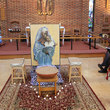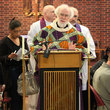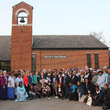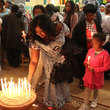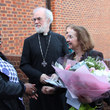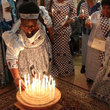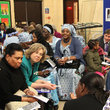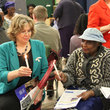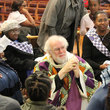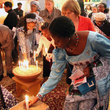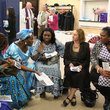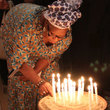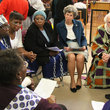Justice for Women service with Anglican Alliance and Mothers' Union
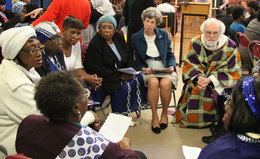
Thursday 15th March 2012
Archbishop Rowan Williams and Mrs Jane Williams attended a special eucharist to affirm the achievements of women. The service, held on March 15th at St George Camberwell, was timed to mark International Women's Day (March 8th) and Mothering Sunday (March 18th), and was arranged by the Anglican Alliance in conjunction with the Mothers' Union.Attending the eucharist were members of four Mothers' Union branches: St George's, St Luke's and St Giles' in Camberwell and St John Chrysostom with St Andrew in Peckham. The women shared with Archbishop Rowan and Jane their stories and reflections on personal achievements as well as challenges experienced by women and girls in the areas of social, economic and legal justice. 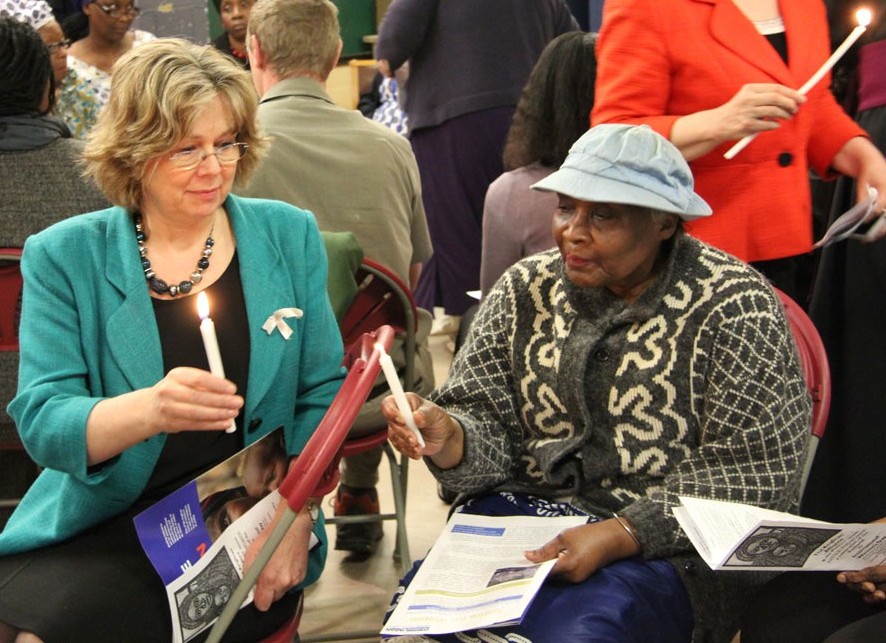 Also present were Baroness Northover (Government Spokesperson in the House of Lords on International Development and on Health, Justice and Women and Equalities), Sally Keeble (Director of the Anglican Alliance) and Fiona Thomas (Communications Director of the Mothers' Union).
Also present were Baroness Northover (Government Spokesperson in the House of Lords on International Development and on Health, Justice and Women and Equalities), Sally Keeble (Director of the Anglican Alliance) and Fiona Thomas (Communications Director of the Mothers' Union).
The Archbishop preached on Mark 5:24b-34, the account of the woman who touched Jesus' cloak and was told 'Go in peace and be healed'. The Archbishop said:
'What Jesus says to that woman he says to all of us, men as well as women: don't be imprisoned by what's expected of you. Reach out in whatever way you can with respect and love to help your neighbours feel at home with their broken, abused bodies. Help them come back to themselves. 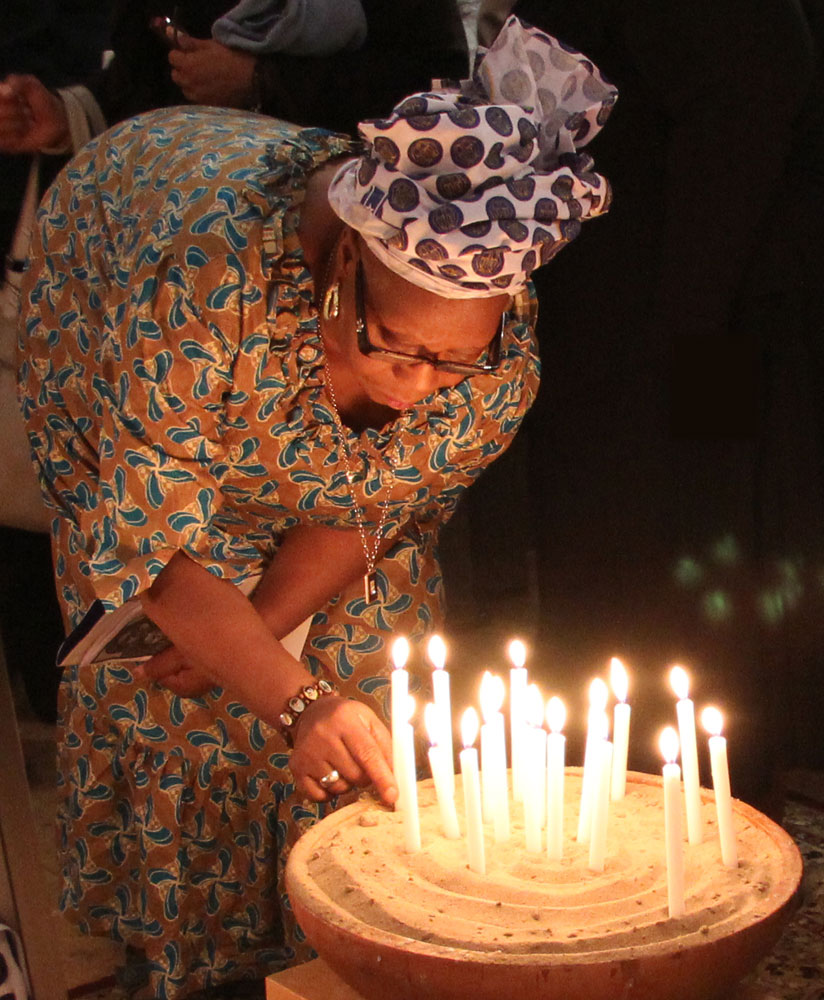 And don't be afraid or ashamed of saying "I am the one who has been healed", giving glory to God by the way in which you spread that healing in every touch and every word and every look.'
And don't be afraid or ashamed of saying "I am the one who has been healed", giving glory to God by the way in which you spread that healing in every touch and every word and every look.'
In his homily, the Archbishop praised the work of the Mothers Union in 'giving women the courage to do what's not expected, and to go where they're not expected, and to touch those who don't expect to be touched and embraced.'
Jane Williams, wife of Archbishop Rowan Williams, had prepared a special prayer for the service and led the congregation in a candle-lighting ceremony as an act of witness to the need for justice for women everywhere:
Just and gracious God, we pray for all women who go in fear and poverty today, and whose needs are hidden in the darkness of our world's indifference. Let this light be a symbol of the liberating light of your gospel, and may we who are gathered here today become light-bearers, so that all may see your glory reflected in lives renewed.
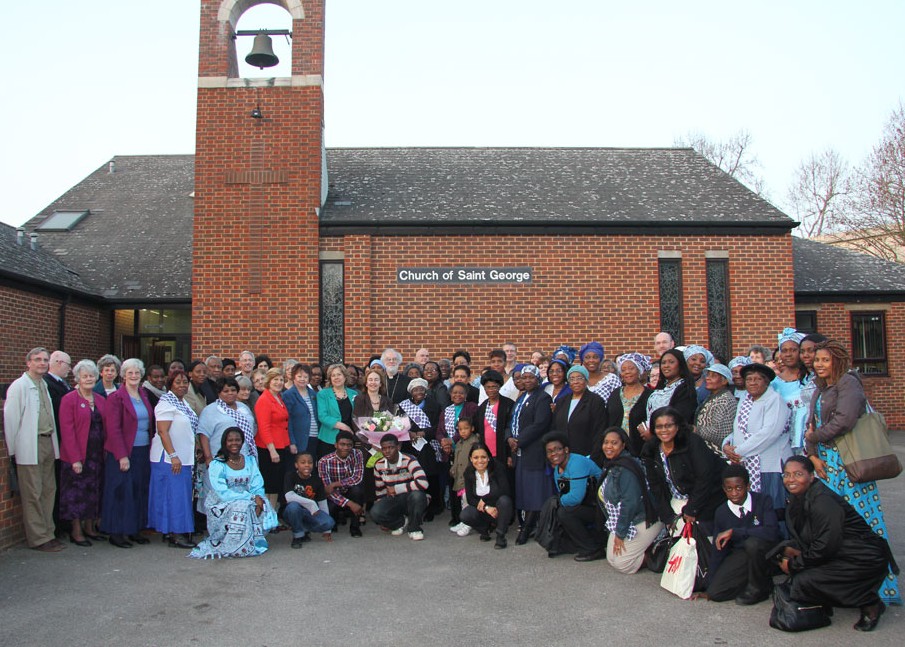
Listen to the Archbishop's homily, or read a transcript below.
Homily by Archbishop Rowan Williams
15th March 2012, St George Camberwell
Reading: Mark 5:24b-34
When we think about the woman in this gospel reading, we can think of a woman whose experience is very close to that of a lot of women in the world today. She had endured much under many physicians and had spent all that she had, says the gospel. And we think of women throughout the world who don't have the resources they need to care for themselves and their children. We think of the cost of drugs for those who most need medication. We think of the despair that can overtake people who cannot give themselves or those closest to them what they most need. We think, in other words, of a kind of injustice which then, just as now, is too widespread for comfort.
But how does the woman respond? She does what is not expected of her. We've been reminded in what's just been said and in many of the stories around; we've been reminded about how what's expected of you can cripple you. You're surrounded by expectations: this is all you are, this is all you can do. You can never really make a difference. You can never really have your own life and control of your own circumstances. You're expected to take what comes to you and to put up with it. And sometimes, as I was hearing just now, the Christian church is guilty of saying "Put up with it. You must take what comes to you."
But this woman does what nobody expects. She steps out, and she grabs hold of hope when she can see it. Literally - she grabs hold of Jesus' cloak as he walks past. She sees hope; she seizes it; she lays hold on it; she lays claim to her own longing for healing. She lays claim to God's willingness to give her healing. So part of her story of healing is doing what isn't expected of her - stepping out when she sees a possibility of healing, and not letting go until the difference begins to be made.
I'm always fascinated by how full the gospels are of the stories of noisy, embarrassing women, who step out and lay claim to something; who seize hold of Jesus and say "I know you have what I need." So, there's one thing for us to think about: stepping out. Not being imprisoned by what is expected of us, but being able to see where healing is and going for it and laying claim to it.
But the second thing that strikes me about this story is a wonderful phrase: "She felt in her body that she was healed". She felt in her body that she was healed. So much of what we've been sharing and thinking about is the experience of women whose bodies have been abused in all kinds of ways. Whose bodies have been abused by rape, by violence, in situations of conflict, in the home as well. And if that is where injury and outrage happen, that's where healing has to be felt. That's where touching is so important - the restoration, the sense that your body matters, that your body deserves healing and nurture.
And one of the gifts that women so often give to each other is that gift of touch; of physical contact that makes you feel your body differently. Not as an object of violence or contempt or pollution – which must have been one of the worries this women had – but your body as a place where God wants to dwell. Your body as a place where healing and salvation happen. "She felt in her body that she was healed" – and what that says to us is that as we embark on healing, part of what we have to do is to help other people feel at home in their bodies in a new way. When those bodies have been violated and outraged, those who want to bring help and healing to them have to be alongside to assist women, particularly, to feel their bodies afresh.
How often do we hear stories told of women who have endured rape or violence being, as it were, made to bear the blame of it? We were talking about rape over there. So often the fear of reporting it, the fear of talking about it, is the fear of being made to feel not only that you're guilty but your body carries that guilt, your body is unacceptable and unclean. And that's a second area where we have to be reaching out, doing what's not expected of us, helping those who have been abused in their bodies – the sense that those bodies are capable of being made whole; are not evil, are not polluted or polluting.
And then, we have this episode where Jesus turns in the crowd and says "Who touched my clothes?" It's one of those moments in the gospels that's almost comical - the crowd far bigger than the crowd in here today; Jesus in the midst of it, jostled by everybody. And suddenly he turns around, saying "Somebody touched me." And the disciples say "Oh for goodness' sake, everybody touches you. This is a crowd, you know? Wake up." And Jesus says "No. I know there was a transaction. There was a relationship somewhere. I felt that. So who was it?" And the woman steps out and says "I am the one who was healed."
Now, that really is another kind of claim; another kind of taking power and authority. Step out and say "I've been there, in the middle of misery, abuse, violence, and I have been healed." Stepping out to speak that good news from your own experience, your own suffering, your own struggle, your own labour; coming through and stepping out from the crowd to say "I have been healed. It can happen. It happened here in this body; this body of mine."
And so the gospel tells us, when we sense the healing of Christ in our bodies and our lives; however we've experienced that, whether in prayer and intense spiritual wrestling; whether in the sheer, simple kindness of a neighbour who makes us feel differently about our bodies; wherever we've felt that healing of Jesus, are we willing to step forward and say "Yes, it's me that was healed. I've been through it and I can share with you the knowledge that things could be different because of the gospel"? Well, all of those are things which I know the Mothers' Union is profoundly committed to. I know how much the Mothers' Union, when it works at its best, does exactly that. Giving women the courage to do what's not expected, and to go where they're not expected, and to touch those who don't expect to be touched and embraced.
Last year, in Congo, I saw something of what can be done there. Not only with women who have been the subject of violence, but also with young people, men and women; abducted, taken into the militias, abused and made into abusers. And the Mothers' Union is among those who go out to them, who go where they're not expected to go and do what they're not expected to do, and lay hold – lay claim to evil. And hold on, literally, to the bodies and spirits of those abused young people. It's part of what can be done, and it happens because the women in the Mothers' Union are willing to testify in deed and word, "I am the one who is healed. I have something to tell you. Out of all the bitterness, and all the pain and the struggle, I have something to say."
The woman comes forward, and she does again what she'd never expected to do. She looks Jesus in the face. She fell down before him and told him the whole truth. But of course you can't tell the whole truth if your face is to the ground. She lifts her head; she speaks to Jesus. She tells him that she's the one who is healed. She looks him in the face, and he says to her "Your faith has made you well. Go in peace and be healed."
And I think that when he tells her to go in peace, he’s telling her: “Go, at home in your body for the first time in years. Go, conscious that in the risk you’ve taken, you’ve laid hold - you’ve laid claim on healing. Go, and speak as one who has been healed; identify yourself and say ‘Yes, the difference was made in me.’”
What Jesus says to that woman he says to all of us, men as well as women: don't be imprisoned by what's expected of you. Reach out in whatever way you can with respect and love to help your neighbours feel at home with their broken, abused bodies. Help them come back to themselves. And don't be afraid or ashamed of saying "I am the one who has been healed", giving glory to God by the way in which you spread that healing in every touch and every word and every look.
In the name of God, Father, Son and the Holy Spirit, Amen.
© Rowan Williams 2012

